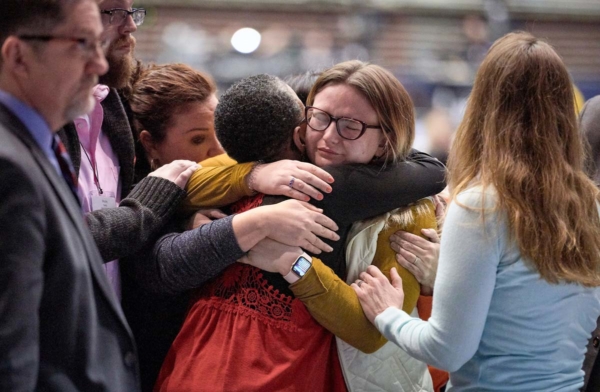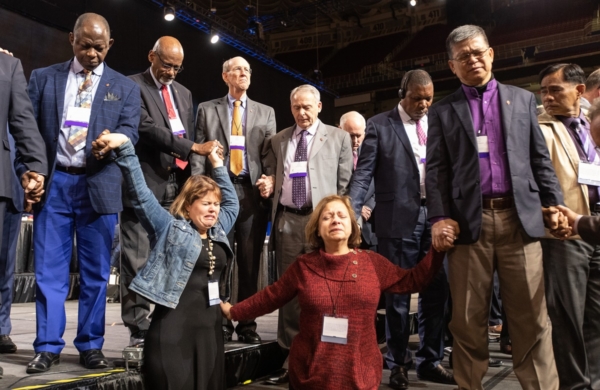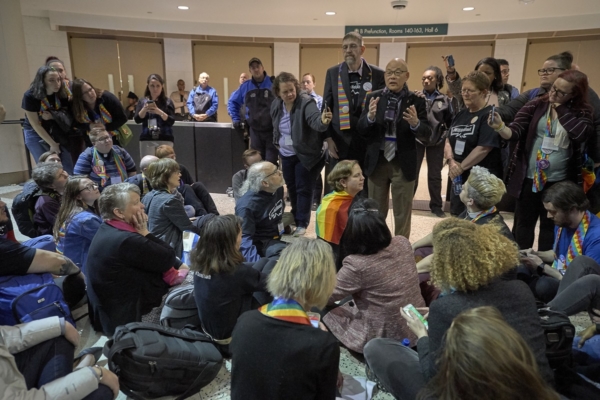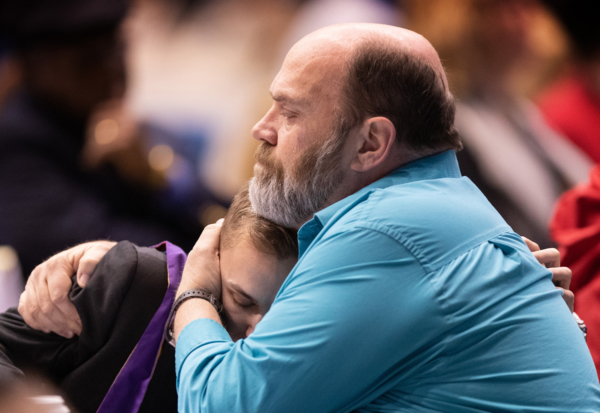Episcopalians, Methodists ponder full-communion proposal after UMC votePosted Mar 12, 2019 |
|

Delegate Shayla Jordan receives hugs after speaking in support of the One Church Plan during the 2019 United Methodist General Conference in St. Louis, Missouri. Young United Methodists have differing views on whether the Traditional Plan, adopted by the special General Conference, is the best way forward for the denomination. Photo: Paul Jeffrey/UM News Service.
[Episcopal News Service] The United Methodist Church’s recent decision to reinforce its opposition to same-sex marriage and the ordination of LGBTQ clergy has not sidetracked pending consideration of a full-communion agreement between The Episcopal Church and the United Methodist Church.
Rather, the controversial decision has put dialogue between the two churches in a kind of prayerful pause while both denominations discern the vote’s impact and the Methodist church awaits a denominational ruling on the constitutionality of some parts of the decision.
“At this moment, we are in the same place that we were six months ago, except that we are deep in prayer for their situation,” the Rev. Margaret Rose, ecumenical and interreligious deputy to The Episcopal Church’s presiding bishop, told Episcopal News Service.
Six months ago, the United Methodist-Episcopal dialogue committee made final edits to the full-communion proposal, “A Gift to the World: Co-Laborers in the Healing of Brokenness,” that was first released in May 2017.
The dialogue committee is due to gather again in a previously scheduled meeting April 29 in Austin, Texas, during which, Rose said, Episcopalians “will hear directly from those who have been deeply involved in this work and are saddened by the decision.”
On Feb. 26, the United Methodist Church’s 2019 Special Session of General Conference approved, by a vote of 438-384, a “Traditional Plan,” which did not change the UMC’s position on the full inclusion of LGBTQ people in the life of the denomination but hardened some of the its current policies. For instance, it set a minimum penalty of one year’s suspension without pay for clergy performing a same-sex wedding for the first offense, and loss of credentials for the second, according to UM News Service. And the plan reinforced the church’s existing prohibition on “self-avowed practicing” gay clergy.
The delegates rejected plans that would have either eliminated all restrictions on same-sex marriage and ordination of gay clergy in the denomination’s Book of Discipline or left such decisions up to individual geographic entities known as conferences.
The Special Session also approved a disaffiliation plan, sometimes called an “exit plan.” It would allow congregations to leave the denomination with their property, with limitations, “for reasons of conscience” regarding issues of human sexuality. The plan’s provisions would stand in contrast to The Episcopal Church’s canonical and legal stance that local property is held in trust for the entire denomination and thus cannot be retained when a majority of a congregation and its leaders decide to leave.

Florida delegates Rachael Sumner (front left) and the Rev. Jacqueline Leveron (front right) of the Florida Conference join in prayer with bishops and other delegates at the front of the stage before a key vote on church policies about homosexuality during the 2019 United Methodist General Conference in St. Louis, Missouri. Photo: Mike DuBose/UM News Service
The UMC Judicial Council will rule on the constitutionality of some of the provisions related to the Traditional Plan when it meets in Evanston, Illinois, April 23-25.
Deirdre Good, the Episcopal co-chair of the dialogue committee, told ENS via email, “We are all praying for, and staying in touch with our UMC sisters and brothers whilst we wait specifically for what the Judicial Council will say.”
Bishop Gregory Palmer, resident bishop of the United Methodist Church’s Ohio West Area and co-chair of the dialogue committee, noted in an interview with ENS that the Judicial Council has ruled that some portions of the Traditional Plan are constitutional. They include an “augmented” definition of “self-avowed practicing homosexual” and the minimum penalties provision for clergy performing a same-sex wedding.
Even if the council decides that the provisions on which the General Conference asked for a ruling are unconstitutional, Palmer said, “it won’t undo the other parts, at least in a technical sense; whether or not it will make their impact less is an unknown, but it won’t take them off of the books.” However, the next General Conference in Minneapolis May 5-15, 2020, could make such a decision, he said.
As it stands now, the legislation is not the official church law until Jan. 1, 2020, for churches in the United States. It takes effect in churches outside the U.S. after the 2020 General Conference, according to a UMC report.
The two items on the April 23-26 docket of the #UMC's top court deal with the constitutionality questions related to the Traditional Plan and an exit plan approved by #GC2019. https://t.co/EihKLTy9h2 pic.twitter.com/4yixpeB7mx
— United Methodist News (@UMNS) March 12, 2019
The current timeline calls for the UMC to consider the full-communion proposal at that same 2020 meeting and for The Episcopal Church’s General Convention to do likewise in 2021. The work that led to the proposal began in 2002 after General Convention authorized the conversation in 2000. Under Interim Eucharistic Sharing guidelines established by General Convention in 2006, Episcopal congregations can hold joint celebrations of the Eucharist with United Methodist churches.
The Episcopal Church defines “full communion” to mean “a relation between distinct churches in which each recognizes the other as a catholic and apostolic church holding the essentials of the Christian faith.” The churches “become interdependent while remaining autonomous,” the church has said. Such agreements are not mergers, and Rose said, they are “permissive, not proscriptive,” meaning no part of either church is required to do the things that the agreement would allow.
Meanwhile, Palmer said he plans to “move full steam ahead” with the proposed agreement “across the table with our Episcopal colleagues” and within the Methodist Council of Bishops. “The basic outlines of the full-communion proposal are still essentially the same, even though many voices, including many Episcopalians, had hoped that we might become more inclusive in terms of who could be clergy and what clergy could do,” including being in a same-sex marriage or performing them for others, he said.
Palmer is due to present the proposal to the Council of Bishops this May. He said he will urge them not to slow down the agreement’s timeline. Some might suggest a pause, he said, adding that it will be important to discern if the hesitancy stems from the human sexuality stances of the two churches or, for example, from questions some bishops have always had about the sacramental differences between Episcopalians and Methodists.
“I do think we have to be honest with each other and then we have to be discrete, meaning we have to have some way of separating the bone from the marrow,” he said.
The executive committee of the #UMC in Germany says stipulations in the Traditional Plan "unacceptable," and the German church will not impose the stricter penalties in the plan. https://t.co/ViY32bh6jL pic.twitter.com/DiO0QmBLv5
— United Methodist News (@UMNS) March 12, 2019
The two churches’ theologies of Holy Communion differ in matters of emphasis, according to an explanation by the dialogue committee here. Both Episcopalians and Methodists believe that Christ is really present in the Eucharist. Episcopalians officially offer the Eucharist to all baptized Christians, whereas Methodists do not require a person to be baptized. Episcopalians typically have Eucharist at least every Sunday, while some United Methodist churches celebrate Communion weekly and others do so less often. Episcopalians consecrate wine while Methodists use grape juice.
And, of course, there is the sacramental difference over marriage. The Rev. Kyle R. Tau, the UMC Council of Bishops’ ecumenical staff officer, told ENS that he thinks the dialogue committee will need “to take an honest look at the implications of the General Conference’s decision for both of our communions, and what it might mean for the timing and process related to the full-communion agreement. We remain committed to working together, to staying in dialogue and to moving the goal of unity forward in whatever way we can.”
The Rev. Robert Williams, retired after 35 years as a Methodist pastor, is a member of the dialogue committee, and he told ENS that “the only thing that would be safe to say is nobody can predict what may be ahead.”
Williams, who lives in Ocean City, New Jersey, had preferred that his church choose the path of inclusivity toward LGBTQ members, but as part of the full-communion committee, his focus is on keeping that process moving forward.
Williams raised the possibility that the process could succumb to reservations, on both sides, about forging closer ties between denominations seemingly at odds on issues of sexuality. And though he was reluctant to comment on speculation that the United Methodist Church could split over those issues, a schism could add confusion to full-communion talks.
“The question then becomes, who is The Episcopal Church in dialogue with?” he said.
That said, the outcome for the Methodists is far from settled, and Williams still sees room for hope.
“The hope always is that people can disagree on issues such as this without them becoming church-dividing issues,” he said.

United Methodist Bishop Robert Hoshibata meets with protestors upset about the passage of the Traditional Plan, which affirms the church’s current bans on ordaining LGBTQ clergy and officiating at or hosting same-sex weddings. The vote came on Feb. 26, the last day of the 2019 General Conference in St. Louis, Missouri. Photo: Paul Jeffrey/UM News Service
Two Episcopal priests, both with a history of ecumenical work, have recently written blog posts calling for prayer and a measured response from Episcopalians. The Rev. Thomas Ferguson, a member of the dialogue committee, urged his readers, “Let’s not forget the mote in our own eyes as Episcopalians.”
“We have dioceses which do not fully incorporate LGBT persons in the life of the church, and same-sex marriages rites are still not openly available to all. We still have significant gender disparity in leadership. We are part of a global communion which is mostly opposed to full inclusion of LGBT persons,” he wrote.
Ferguson, rector of St. John’s Episcopal Church in Sandwich, Massachusetts, hopes that everyone involved “can see where God is calling people to new and different ways of being church: that we who sow now in tears may reap with songs of joy.”
The short answer in the blog post “How to Deal with Methodists at your Red Church Doors” by the Rev. David Simmons, rector of St. Matthias Episcopal Church in Waukesha, Wisconsin, was: “Don’t be a jerk.”
“Our first reaction doesn’t need to be to look at them as a new source of recruitment for The Episcopal Church,” Simmons said in a phone interview with ENS. Some Methodists may no longer feel at home in their own church, he added, but most will still identify as Methodists even if they come looking for a temporary spiritual home elsewhere.
“I think the most important thing, for one, is to understand that the United Methodist Church is very diverse and governed in a different way than ours is,” Simmons said. He figures Methodists include at least as many LGBTQ clergy and laypeople as The Episcopal Church, and they “are fighting for their church. They’re wanting to stay. … That’s what’s at stake.”
Simmons serves as president of Episcopal Diocesan Ecumenical and Interreligious Officers and, in that capacity, has assisted the dialogue committee.
He doesn’t think the Methodists’ vote derails full-communion talks, especially given how much the two denominations have in common on the fundamentals of their Christian faith. The vote, however, could push Methodists into such an intense debate over sexuality that the dialogue on full communion simply gets pushed to the sidelines.
What the Methodists did and did not do, and how they decided

The Rev. Bill Mudge (right) comforts fellow delegate Jeffrey “J.J” Warren of the Upper New York Conference after Warren spoke in favor of full inclusion for LGBTQ persons in the life of the United Methodist Church during the 2019 United Methodist General Conference Feb. 25 in St. Louis, Missouri. Photo: Mike DuBose/UM News Service
Two other aspects of the UMC vote are important to note. First, LGBTQ people have not been banned from the United Methodist Church, the UM News Service said in an explainer article after the vote. However, since the 1972 General Conference, the UMC has said that while all people are of sacred worth, “the practice of homosexuality is incompatible with Christian teaching,” according to UM News reports.
The United Methodist Church’s current statements about homosexuality, same-sex marriage and the ordination of LGBTQ persons in the 2016 Book of Discipline are here.
Second, UMC polity is very different from that of The Episcopal Church. The United Methodist Church’s General Conference is an international body of nearly 1,000 delegates that generally meets every four years. Delegates are elected by annual conferences and represent all annual conferences around the world. No such body exists in The Episcopal Church, even though General Convention has deputies and bishops from outside the United States. To replicate something resembling the General Conference, representatives of every Anglican Communion province would have to be empowered to gather and set policy for all the churches.
Half of the General Conference delegates are laity, half are clergy. Bishops attend the General Conference but cannot vote. Some bishops serve as presiding officers, but other bishops cannot speak unless permission is specifically granted by the delegates.
Delegates are proportionately distributed among annual conferences by applying a statistical formula based on the number of clergy and professing lay members of each conference. About 40 percent of the 862 delegates for the 2019 Special Session came from outside the United States, according to figures here. Statistics on the 2020 delegates, which show roughly the same pattern, are here.
And, the vote was not monolithic among all U.S. Methodist delegates. The Rev. Joe DiPaolo, pastor of First United Methodist Church in Lancaster, Pennsylvania, is part of the Wesleyan Covenant Association that successfully championed the Traditional Plan.
“I think I will lose some folks who are more progressive,” DiPaolo told UM News Service. He issued a statement about the General Conference and held a church meeting to discuss the outcome. “Things are kind of raw,” he said.
While many Korean #UMC clergy support the Traditional Plan adopted by General Conference, some expressed concerns with the plan and disappointment over treatment of LGBTQ community. https://t.co/jySXBWRFnJ pic.twitter.com/LG8qIR7uF3
— United Methodist News (@UMNS) March 12, 2019
The Rev. Grace Oh of Englewood-Rust United Methodist Church in Chicago has supported the Traditional Plan but not schism.
“I feel relieved after the General Conference adopted the Traditional Plan,” she told UM News Service. “Now I am going to focus on what I have been doing as a pastor. I will love my church and people of God.”
Michael McDowell, 21, a junior at Rice University who is planning a career in United Methodist ministry, said he had mixed feelings about the vote.
“I’m pretty conservative theologically, and a lot of young United Methodists are a lot more conservative theologically than the general discussion about them seems to be. … I’m glad the church voted to stick with their theological guns.”
But McDowell said he worries “that this pretty much means that the church is going to split.”
What full communion with the UMC would look like
There are 12.5 million Methodists with just more than half of them in the United States, among members of the 80-million-strong World Methodist Council. The Episcopal Church has nearly 1.9 million members and is a province of the Anglican Communion, which has 85 million members in 165 countries.
The Episcopal-Methodist full-communion proposal outlines agreements on the understanding of each order of ministry. The ministries of laypeople, deacons, Episcopal priests and United Methodist elders would all be seen as interchangeable yet governed by the “standards and polity of each church.”
Both churches have somewhat similar understandings of bishops, according to the proposal.
“We affirm the ministry of bishops in The United Methodist Church and The Episcopal Church to be adaptations of the historic episcopate to the needs and concerns of the post-[American] Revolutionary missional context,” it says. “We recognize the ministries of our bishops as fully valid and authentic.”
The Episcopal Church and the United Methodist Church would pledge that future consecrations of bishops would include participation and laying on of hands by at least three bishops drawn from each other’s church and from the full-communion partners they hold in common: the Moravian Church and the Evangelical Lutheran Church in America.
The Episcopal Church currently is in full communion with the Evangelical Lutheran Church in America; the Mar Thoma Syrian Church of Malabar, India; Old Catholic Churches of the Union of Utrecht; the Philippine Independent Church; the Church of Sweden; and the Northern and Southern Provinces of the Moravian Church. It is also engaged in formal bilateral talks with the Presbyterian Church (USA) and the Roman Catholic Church via the U.S. Conference of Bishops.
– The Rev. Mary Frances Schjonberg is the Episcopal News Service’s senior editor and reporter. David Paulsen is an editor and reporter for the Episcopal News Service.

Social Menu